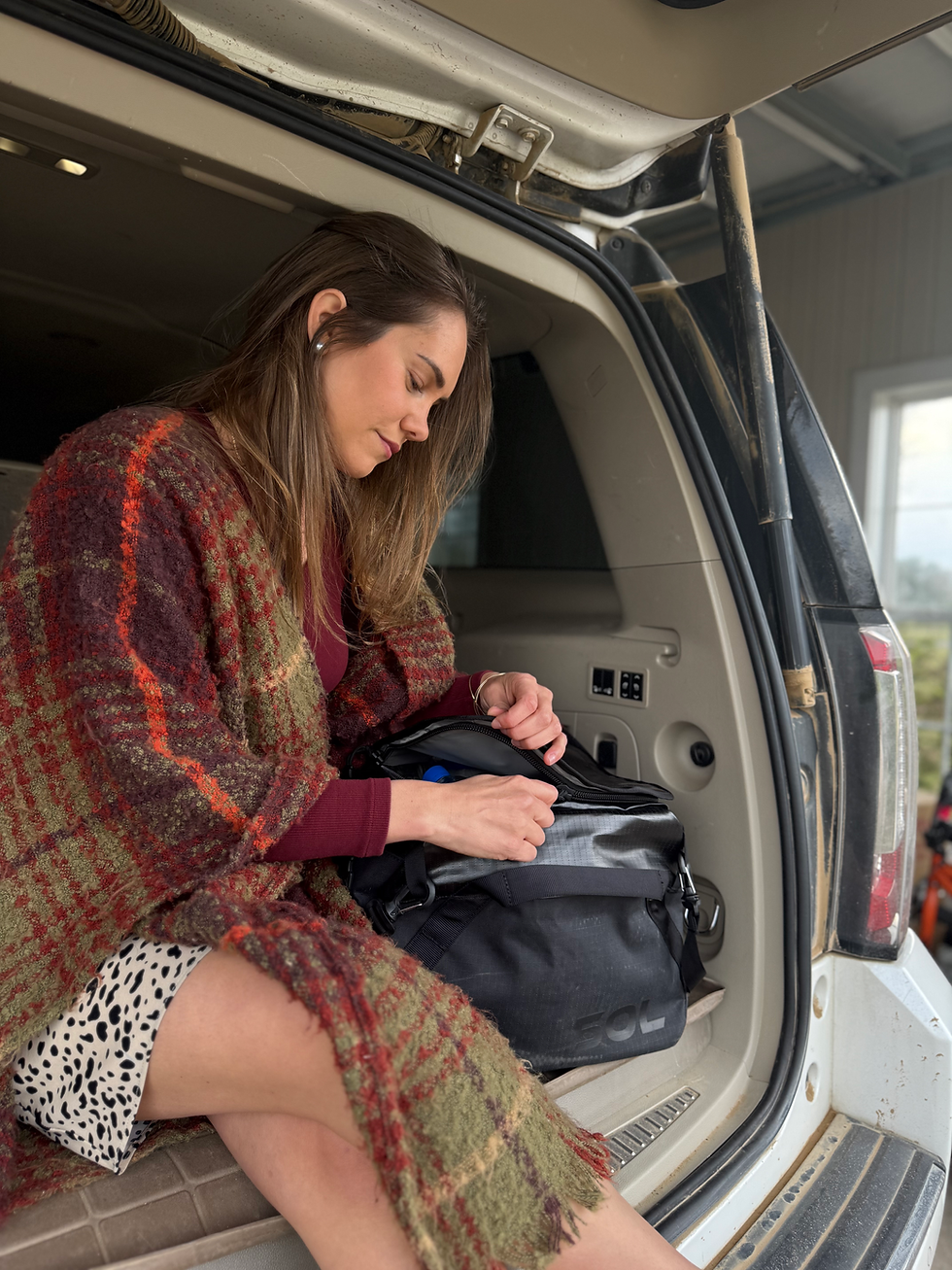Beyond the Glove Box: Creating a Comprehensive Vehicle Medical System
- Amber Elle

- Apr 11, 2025
- 4 min read
The average family spends over 20 hours each month in their vehicle—commuting, running errands, embarking on adventures, and connecting to the places that matter in their lives. Yet most of us give little thought to preparation beyond perhaps a spare tire and jumper cables (sidenote: PLEASE replace that with a https://amzn.to/3v1rJse as soon as your budget allows...)
I've come to see my vehicle as not just transportation, but as a potential aid station—a place where I can effectively respond to everything from minor discomforts to serious emergencies. Today, I'm sharing my layered approach to vehicle medical preparedness, designed with both accessibility and comprehensiveness in mind.

A Philosophy of Layered Preparedness
When it comes to medical emergencies, time matters. That's why I've created a two-tiered system:
Immediate Access Trauma Supplies - Positioned within arm's reach of both driver and passenger seats
Comprehensive Medical Kit - Organized in my Vertx Siege backpack for secondary needs and more complex situations
This approach ensures that life-threatening emergencies can be addressed instantly, while still having access to a complete medical arsenal for everything else.
Always use code AMBERELLE at Vertx when shopping for gear for an exclusive discount!
Tier 1: Immediate Access Trauma Supplies
For critical emergencies where seconds count, I keep these items within immediate reach of the front seats:
Tourniquets - One for driver access, others for passenger(s) access
Emergency Trauma Dressing - For immediate pressure on severe wounds
Hemostatic Gauze - To promote rapid clotting for severe bleeding
Trauma Shears - To quickly cut through clothing or seatbelts
Nitrile Gloves - For protection during bleeding emergencies
These items are positioned for one-handed access, even while seated with a seatbelt on. The goal is to be able to address catastrophic bleeding within seconds of stopping the vehicle.
Tier 2: The Vertx Siege Backpack System
For my comprehensive medical kit, I recently transitioned to the Vertx Siege tactical backpack. This outstanding pack offers several advantages:
Organized Compartments - Multiple pockets and sections for logical organization
Durable Construction - Built to withstand the rigors of vehicle storage
Mobility Option - Can be grabbed quickly if evacuation is necessary
Everything inside is organized into clear zippered pouches for instant visual identification, even in stressful situations. Here's how I've organized the system:
Pouch 1: Basic Medical Essentials
This pouch contains the items most frequently needed for everyday issues:
Povidone Iodine Swabs - For wound cleaning and disinfection
Alcohol Prep Pads - Alternative cleaning option
Assorted Bandages - Various sizes for different wounds
Antibiotic Ointment - For wound care
Eye Drops - For irritation and foreign objects
Ear Drops - For swimmer's ear and discomfort
Honey Packets - Blood sugar hero!
Sting-Kill - our insect sting solution
Narcan - For responding to opioid overdose emergencies
Tweezers - For splinter removal and fine manipulation
Nail Clippers - For hangnails and minor nail issues
Pouch 2: Secondary Bleeding Control
This pouch supplements the immediate-access trauma supplies:
Israeli Bandages - For pressure dressings on larger wounds
Combat Gauze - Additional hemostatic agent
Compressed Gauze Rolls - For wound packing
Medical Tape - Various widths
Pressure Bandages - For sprains and strains
Pouch 3: Advanced Care Items
For more complex medical situations:
Chest Seals - For penetrating chest wounds
Eye Shields - To protect injured eyes
SAM Splints - Moldable splints for fracture stabilization
Emergency Blanket - For shock management and warmth
CPR Mask - For safer rescue breathing
Surgical Gloves - Multiple pairs for extended care
Sterile Staples - For emergency wound closure (with training)
Pouch 4: Medications
Carefully organized and clearly labeled:
Dye-Free Ibuprofen - Children's and adult formulations
Acetaminophen - Children's and adult formulations
Diphenhydramine (Benadryl) - For allergic reactions
Anti-Nausea Medication - For motion sickness and upset stomach
Anti-Diarrheal Medication - For children and adults
Electrolyte Packets - For rehydration
Instant Cold Compresses - For comfort and swelling reduction
Heat Packs - For muscle pain and comfort
Additional Items
Waterproof First Aid Guide - For reference in stressful situations
The Importance of Organization
When emergencies happen, stress impacts our ability to think clearly. The clear visual organization system allows me to:
Quickly locate exactly what I need
Assess inventory at a glance
Restock efficiently
Direct others to help find supplies if necessary
Beyond the Supplies: Training and Knowledge
While having supplies is essential, knowing how to use them effectively is equally important. I recommend:
Taking a basic first aid course or watching online training videos from a reputable source
Learning CPR
Regularly reviewing the contents of your kit
Practicing access to critical items
Finding the Balance
It might seem like overkill to some, but I've found this system strikes the right balance between preparation and practicality. It takes up minimal space in my vehicle while providing maximum capability.
This isn't about living in fear or expecting disaster around every corner. It's about the profound peace that comes from knowing I've done what I can to be ready for whatever comes our way.
Your Vehicle Medical Kit
What do you keep in your vehicle for medical emergencies? Are there items you've found particularly useful that I should consider adding? I'd love to hear your thoughts and experiences in the comments below!
For those interested in building a similar system, I've included links to the products mentioned below. (These are affiliate links that help support this blog at no additional cost to you.)
Here's to safe travels and the quiet confidence that comes from thoughtful preparation!







Comments